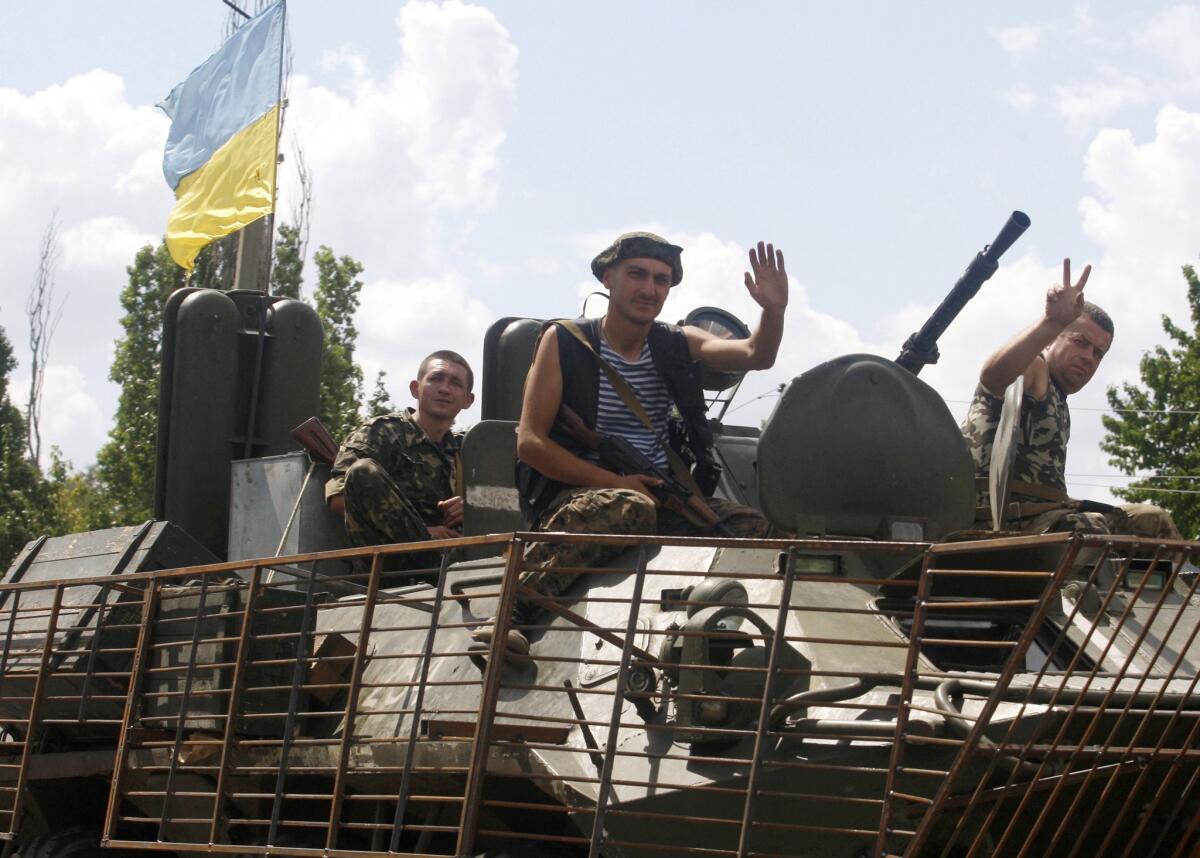Leaders OK plan for Russia aid delivery to eastern Ukraine

- Share via
The presidents of Russia and Ukraine announced agreement Monday on a plan to get aid to civilians trapped in embattled eastern Ukraine after Moscow agreed to submit to International Committee of the Red Cross oversight and the participation of Western governments.
Russian President Vladimir Putin made the announcement after consultation with European Commission President Jose Manuel Barroso, who also spoke with Ukrainian President Petro Poroshenko about the proposal, which Kiev had rejected repeatedly.
Ukraine’s government had accused the Kremlin of planning to use the humanitarian convoy as cover for sending weapons and fighters to aid pro-Russia separatists who are now surrounded in their two remaining strongholds.
Ukrainian troops have been closing in on the separatists in Luhansk and Donetsk in recent weeks, and artillery exchanges have knocked out power and water to many areas of the cities. An artillery shell hit a high-security prison in Donetsk on Sunday, blowing a crater through a brick wall and disabling the security system. More than 100 prisoners escaped, although about a third were reported to have returned Monday.
Putin and Russian Foreign Minister Sergei Lavrov announced they were dispatching the aid convoy before Poroshenko endorsed the international agreement, suggesting the Kremlin had prevailed in its weeks-long effort to intervene on behalf of the Russian-speaking areas still marginally under separatist control.
Russia has massed at least 20,000 troops along its border with Ukraine as its allies in the separatist movement have been pushed back by a resurgent Ukrainian government offensive. NATO Secretary-General Anders Fogh Rasmussen on Monday repeated warnings that Russian troop movements near the border suggested a “high probability” that Moscow was preparing to invade Ukraine.
Barroso’s initial statement on his conversation with Poroshenko said only that the two had “discussed a proposal for humanitarian relief for eastern Ukraine.” It gave no indication of an agreement on the subject, and the European leader warned that any attempt by Russian forces to cross into Ukraine without Kiev’s consent would be seen as an invasion.
Ukrainian government forces in the last month have recaptured more than half the territory seized by separatists in March and April, and Kiev authorities said Monday that they were in the “final stages” of regaining control of Luhansk and Donetsk.
More than four months of fighting have cut those cities off from deliveries of food and medicine, prompting appeals from remaining residents for relief and a protected corridor for evacuation to Russia.
Poroshenko spoke with President Obama after the Russian announcement of aid being dispatched, and the Ukrainian leader’s office then announced that the mission was agreed to with U.S. and European Union support.
“The U.S. president expressed support for the actions of the Ukrainian president, particularly to his initiative on the international humanitarian mission for Luhansk under the aegis of the International Committee of the Red Cross, with participation of the EU, Russia, Germany and other partners,” Poroshenko’s office said. “Barack Obama confirmed the intention of the U.S.A. to take active part in the international humanitarian mission.”
Ukraine’s Foreign Ministry described the relief convoy as a Ukrainian mission with “an international component” that will prevent military aid from being delivered to the separatists under the guise of humanitarian relief.
At Red Cross headquarters in Bern, Switzerland, the head of operations for Europe and Central Asia said details of the relief mission were still being worked out. The official, Laurent Corbaz, said the organization’s involvement was contingent on agreement by all sides to its “fundamental working principles of neutrality, impartiality and independence.”
All parties must also guarantee the security of Red Cross staff and vehicles, Corbaz said, “for the entire duration of the operation, in view of the fact that the organization does not accept armed escorts.”
Follow @cjwilliamslat for the latest international news 24/7
More to Read
Sign up for Essential California
The most important California stories and recommendations in your inbox every morning.
You may occasionally receive promotional content from the Los Angeles Times.











